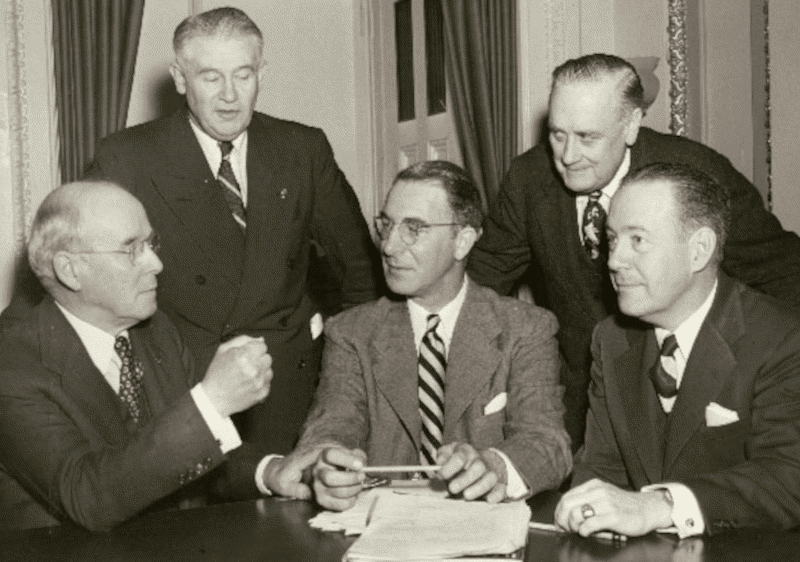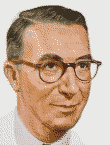

The U.S. Senate's Special Committee to Investigate Organized Crime in Interstate Commerce, chaired by Tennessee Senator Estes Kefauver, did groundbreaking work in the investigation of the American mob. At a time when the FBI failed to officially recognize the existence of a nationwide criminal conspiracy, the Kefauver Committee uncovered the Syndicate's tentacles in every region of the country.

Members of the U.S. Senate Special Committee to Investigate Organized Crime in Interstate Commerce (Kefauver Committee) are shown left to right: Charles W. Tobey (NH), Lester C. Hunt (WY), Estes Kefauver (TN), Alexander Wiley (WI), Herbert R. O'Conor (MD) - photo from U.S. Senate archives.

Kefauver
Carey Estes Kefauver, born July 26, 1903, in Tennessee, was a graduate of the University of Tennessee at Knoxville and Yale University law department. Following the death of U.S. Representative Sam Reynolds in 1939, Kefauver (a Democrat) was elected to complete Reynolds' term in the House. He was reelected to that office four times. In 1948, he was elected to represent Tennessee in the United States Senate.
Early in his first Senate term, Kefauver drafted a resolution calling for a five-member special committee to investigate organized crime. The resolution succeeded in the spring of 1950 only due to the tie-breaking vote of Vice President Alben Barkley. The original resolution specified that the committee would be terminated on March 31, 1951.
A number of the hearings of the Special Committee on Organized Crime in Interstate Commerce were held in large U.S. cities away from Washington, D.C., and were broadcast on television. The broadcasts, which revealed to American citizens the inner workings of their legislative branch, became a public sensation. Citizens also became aware of criminal network, increasing in wealth, power and influence. Interstate gambling networks and corrupt local officials were revealed, as were narcotics trafficking organizations and underworld infiltration of legitimate enterprises.
The Senate extended the committee's life until Sept. 1, 1951. The text of the committee hearings filled numerous volumes, and the committee published three interim reports (August 1950, February 1951, May 1951) and a final report (August 1951) before it dissolved.
Kefauver was an unsuccessful Democratic candidate for U.S. President in 1952 and 1956. He was nominated by the Democratic Party as Adlai Stevenson's VP runningmate in 1956. (The Stevenson-Kefauver ticket was soundly defeated by the Republican ticket of Dwight Eisenhower and Richard Nixon.) Kefauver continued to serve in the Senate until his death on Aug. 10, 1963.
First Interim Report - Aug. 18, 1950
The first interim report of the committee describes what it learned of organized crime in Florida, cooperation of some law enforcement officers with gangsters and encroachment on Florida rackets by outside syndicates.
Second Interim Report - Feb. 28, 1951
The second interim report provides basic information on the operation of organized crime groups in the U.S. and the interstate relationships among gangs. It examines the racing wire service monopoly and corruption of officials and law enforcement.
Third Interim Report - May 1, 1951
The lengthy third interim report provides stories about organized crime in various U.S. cities and analysis of gambling, narcotics, gangster infiltration into legitimate business enterprises and official corruption.
The final committee report summarized the committee's findings and recommendations. It provided a look at the narcotics trafficking racket, its effects and possible remedies. It examined organized crime in medium and large cities. And it provided a status report on contempt proceedings against uncooperative committee witnesses.
Virgil Peterson Testimony - July 6-7, 1950
Virgil W. Peterson had served as special agent in charge of the FBI's Boston office, and previously served with FBI in Milwaukee, Chicago, New York, Philadelphia and Florida offices, before becoming operating director of the Chicago Crime Commission. His testimony outlined his understanding of the development of organized crime in the United States and the status of regional syndicates as of 1950.
The twenty-one lengthy volumes of Kefauver Committee hearing transcripts are available in a variety of digital formats - including PDF, EPUB, Kindle and plain text - through the Internet Archive at Archive.org (contributed by Boston Public Library). We have provided links to the hearing volumes and summaries of their contents below:
Hearings were held May 26, 27, July 13-15, Aug. 9-10, Sept. 19, 22, 26 of 1950. Testimony related to Florida gambling casinos, including Greenacres Casino, Club Boheme, Colonial Inn. Witnesses included law enforcement officials, local government officeholders and Daniel P. Sullivan, director of the Crime Commission of Greater Miami.
Hearings were held Nov. 28, Dec. 28-30 of 1950; Feb. 16-17, 22 of 1951. Testimony focused on organized crime in the area of the City of Tampa, Florida. It explored the bolita gambling racket and the associations of Tampa mobsters with mobsters in other regions. Witnesses included gambling racketeer Charles Wall.
Part 2. Federal and State Officials; California Crime Commission; and Chicago Crime Commission.
Hearings were held June 22-23, 28, July 6-7, Aug. 16 of 1950. Featured testimony was delivered by Virgil W. Peterson, director of the Chicago Crime Commission and representative of the American Municipal Association. (See "Virgil Peterson Testimony" link above.) The committee also heard from representatives of Treasury Department, the Secret Service, the Federal Communications Commission, the Bureau of Prisons, the Post Office Inspectors Department, the Customs Bureau, the Bureau of Internal Revenue and the California Special Crime Study Commission on Organized Crime.
Part 3. Black Market Operations.
Hearings were held Aug. 22 of 1950. Witnesses included career racketeer Frank Livorsi of New York (who discussed Frank Costello, Willie Moretti and other underworld colleagues) and his business partner William Giglio of New York and New Jersey.
Hearings were held July 6, Sept. 28-30 of 1950. Witnesses included James Balestrere, Joseph DiGiovanni, Anthony Gozzo, Tano Lococo, Edward "Eddie Spitz" Osadchey. Testimony related to bookmaking wire service rackets, illegal alcohol manufacture and sales, "Black Hand" extortion and public corruption in the Kansas City area.
Hearings were held June 13, 29, July 18-20, Sept 29-30 of 1950; Feb. 23-24 of 1951. Witnesses included James Balestrere, Vincent Chiappetta, Joseph and Frank DeLuca, Joseph and Peter DiGiovanni, Anthony Gizzo, Tano Lococo, Anthony Lopiparo, Edward Philip (Eddie Spitz) Osadchey. Testimony related to bookmaking wire service rackets, narcotics trafficking, lottery/numbers and slot machine gambling and corrupt underworld-politics partnerships.
Hearings were held Sept. 9, Oct. 5-7, 17-29, Dec. 18-20 of 1950; Jan. 5, 19 of 1951. Witnesses included Anthony Accardo, Joseph Aiuppa, Louis Campagna, Philip D'Andrea, Paul "Ricca" DeLucia, Jack Dragna (of California), Charles Gioe, John Rosselli. Testimony related to tax evasion, bookmaking wire service, gambling, coin-operating vending rackets.
Hearings were held Jan. 17-19, Feb. 19 of 1951. Witnesses included Joseph DiCarlo, James Licavoli, Anthony Milano, Alfred Polizzi and Youngstown, Ohio, Police Chief Edward J. Allen. Testimony dealt with casino gambling at the Jungle Inn, Pettibone, Colony and Mounds Clubs, bookmaking wire service, interstate cooperation of racketeers.

Virginia Hill testifies - photo from U.S. Senate archives. Her testimony is presented in Hearings Part 7: New York-New Jersey. Newsreel video link provided below.
Hearings were held July 11, Aug. 15, Oct. 11-12, Dec. 12-13 of 1950; Feb. 13-15, March 12-16, 19-21 of 1951. Witnesses included Albert and Anthony Anastasia, Gerardo Catena, Frank Costello, Joe "Adonis" Doto, Frank Erickson, Virginia Hill Hauser, Meyer Lansky, Michael Lascari, Willie and Salvatore Moretti, Joe Profaci. Testimony dealt with Saratoga-area gambling casinos, slot machine gambling, craps games, horserace gambling, coin-operating vending rackets, bookmaking wire service. New York-area Mafiosi were questioned about a meeting of underworld figures with Salvatore "Charlie Luciano" Lucania in Cuba. Virginia Hill Hauser was questioned about her relationship with Benjamin Siegel and her acquaintance with Joe Adonis, Joe Fischetti, Frank Costello and Meyer Lansky.
Hearings were held Jan. 25-26 of 1950; Feb. 7 of 1951. Witnesses included Phillip Kastel, Carlos Marcello, The committee questioned the witnesses on casino gambling establishments including the Club Forest and Beverly Club, bookmaking wire service, slot machine gambling. Marcello refused to discuss his businesses, his acquaintances or his police record. (Marcello did reveal his home address but then refused to answer whether he had a mortgage.)
Hearings were held Feb. 8-9, 19 of 1951. Witnesses included William Bufalino, Anthony D'Anna, Peter Licavoli, Angelo Meli, William Tocco, in addition to Michigan Governor G. Mennen Williams and Detroit Mayor Albert Cobo. Testimony included discussions of the old Vitale-Giannola feud, jukebox rackets, gambling.
Hearings were held Nov. 15-18, 20-22, 27, Dec. 13 in 1950; Feb. 27-28, March 2-3 in 1951. Witnesses included Frank Bompensiero, Wilbur Clark, Mickey Cohen, Morris Dalitz, Moe Sedway. Testimony dealt with tax evasion, gambling, narcotics trafficking, relationships of California gangsters with underworld figures outside of the region. Allen Smiley testified about the murder of Benjamin Siegel.
Hearings were held Oct. 13-14 in 1950, Feb. 19-20 in 1951. Witnesses included Harry "Nig Rosen" Stromberg and Philadelphia Public Safety Director Samuel Rosenberg. Testimony focused on gambling and vice crimes, numbers/lottery rackets, coin-operated machine rackets, corruption.
Part 12. Federal and State Officials, and Miscellaneous Witnesses.
Hearings were held July 11 in 1950; Feb. 16-17, 20, March 9, 22, 24, 26-27, 29 in 1951. Witnesses included Jacob Guzik of Chicago, Morris Kleinman and Louis Rothkopf of Cleveland, Abner Zwillman of New Jersey, as well as Federal Bureau of Investigation Director J. Edgar Hoover, Federal Bureau of Narcotics Commissioner Harry J. Anslinger, Judge Samuel S. Leibowitz of Brooklyn NY. In his testimony, Hoover argued against the creation of any national police force and for the continuation of FBI's supporting role for local law enforcement agencies.
Part 13. Miscellaneous Witnesses.
Hearings in executive session were held May 28, June 19 and Aug. 6 in 1951. Witnesses included Murray Humphreys of Chicago, Morris "Mushy" Wexler, John "King" Angersola and George "King" Angersola of Cleveland.
Hearings were held May 29, June 7, 12, 26-27 in 1951. Witnesses included Federal Bureau of Narcotics Commissioner Harry J. Anslinger, Narcotics Bureau Agent Charles Siragusa.
Hearings were held June 20, July 23 in 1951. Witnesses included public officials, judges and law enforcement officials from the state of Kentucky. Testimony focused on gambling handbooks, casinos and slot machines.
Hearings were held June 21-22 in 1951. Witnesses included drug peddlers, users and addicts, as well as Crime Commission of Greater Miami Director Daniel P. Sullivan.
Part 17. Maryland-District of Columbia.
Hearings were held July 2, 9, 18, Aug. 8-9, 17 in 1951.
Hearings were held July 6-7, 11, 17, 19-20, Aug. 15-17 in 1951. Witnesses included Joseph "Doc" Stacher of New Jersey.
Hearings were held June 28, Aug. 7 in 1951.
Carey Estes Kefauver, Biographical Directory of the United States Congress
The Special Committee on Organized Crime in Interstate Commerce, United States Senate, Senate.gov
Kefauver Digital Collections and Kefauver Archival Collections, University of Tennessee Library.